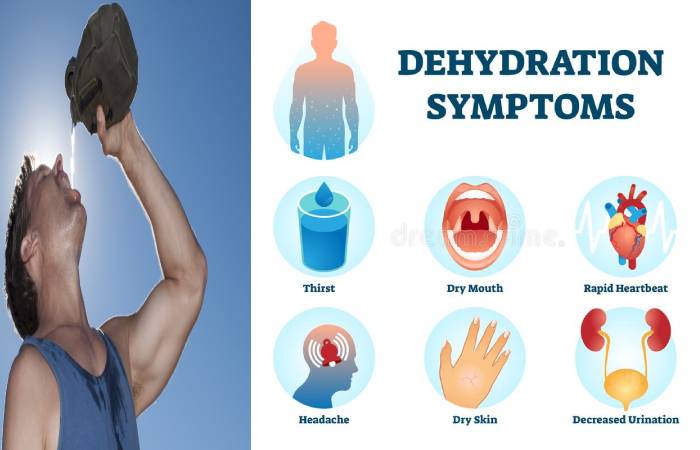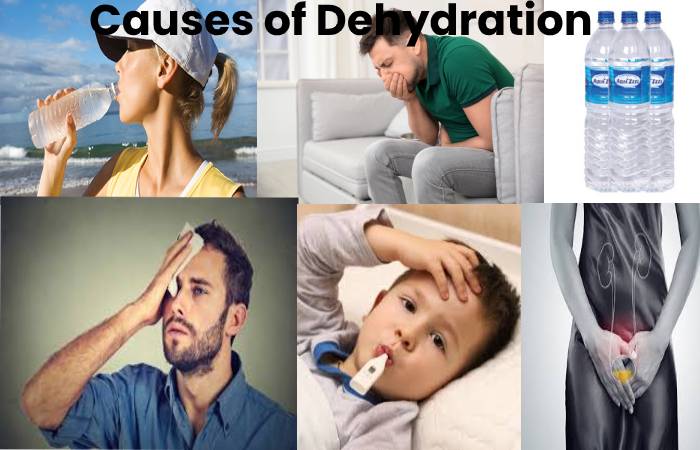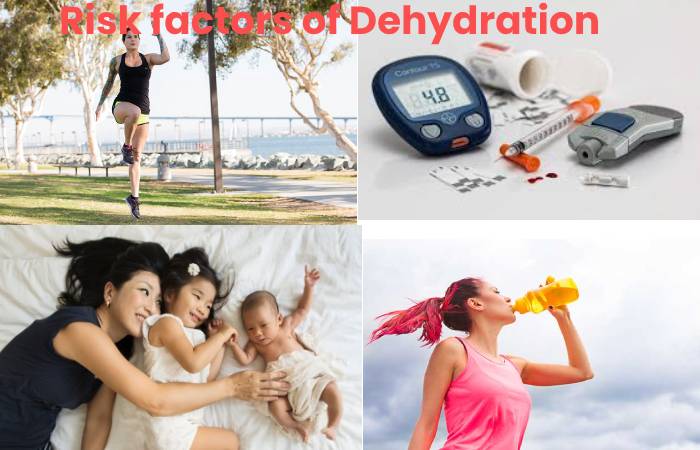Table of Contents
Dehydration Definition
Dehydration happens you use or lose more fluid than you take in. Your body does not contain sufficient water and other fluids to conduct normal functions.
If you don’t replace the fluids you lost, you will become dehydrated. But this condition is especially dangerous for children and older adults.
The most common causes of dehydration in children are severe diarrhoea and vomiting. Older adults naturally have a less volume of water in their bodies, and they may have illnesses or take medications that increase the risk of dehydration.
It means that even minor illnesses, such as infections that affect the lungs or bladder, can cause dehydration in adults.
What are the Symptoms of Dehydration?

There is not always a reliable early indicator of the body’s need for water. Many people, especially older adults, do not feel thirsty until they are dehydrated. That is why it is essential to increase your water intake when it is hot or sick.
The signs and symptoms of dehydration can also vary by age.
- Infants or young children
- Dry mouth and tongue
- Cry without tears
- Do not wet diapers for three hours.
- Sunken eyes and cheeks
- The soft area on top of the head (fontanel) sunken
- Irritability
- Adults
- Excessive thirst
- Less frequent urination
- Dark-coloured urine
- Fatigue
- Dizziness
- Headache
What are the Causes of Dehydration?

Sometimes dehydration occurs for superficial reasons. You don’t drink sufficient because you’re sick or busy, or because you don’t have access to safe drinking water when you travel, hike, or camp.
Other causes of dehydration include the following:
1. Diarrhoea or Vomiting
- Acute and severe diarrhoea (diarrhoea that comes on suddenly and violently) can cause a massive loss of water and electrolytes in a short period.
- You are suffering vomiting along with diarrhoea. You lose even more fluids and minerals.
2. Fever
- In general, the higher your fever, the greater the degree of dehydration.
- The problem is worse if you have a fever in addition to diarrhoea and vomiting.
3. Excessive Perspiration
- You lose water when you sweat. If you engage in vigorous physical activities and do not compensate for fluids during this time, you can become dehydrated.
- If it’s hot and humid, you sweat more and lose more fluids.
4 Increased need to Urinate
- It can be due to undiagnosed or uncontrolled diabetes.
- Certain medications, such as diuretics and certain blood pressure medications, can also cause dehydration, usually because they make you have a greater need to urinate.
Risk factors of Dehydration

All people can become dehydrated, but some are more at risk:
1. Babies and Children
- They are the group most suitable to suffer from diarrhoea and vomiting; babies and children are especially vulnerable to dehydration.
- The child body weight surfaces are more excellent than an adult. Children lose a more significant proportion of fluid in high fever, burns.
- Young children often cannot tell when they are thirsty, nor can they drink a glass of water on their own.
2. Older Adults
- As you get older, your body’s fluid reserves become smaller, your ability to conserve water decreases, and your thirst becomes less acceptable.
- These problems compound by chronic diseases such as diabetes and the use of medications.
- Older adults can also have mobility problems that limit their ability to get water on their own.
3. Chronic Diseases
- Having uncontrolled or untreated diabetes increases your risk of dehydration. Kidney disease also increases your risk, carry out pills that increase urination.
- Even having a cold or sore throat build you more vulnerable to dehydration because you feel less like eating or drinking when you’re sick.
4. Exercise Outdoors
- When it’s hot and humid, the risk of dehydration and heat illness increases, it is because when the air is wet, sweat does not evaporate and cools you down as quickly.
- It usually does, and this can lead to higher body temperature and the need to drink more fluids.
Complications of Dehydration

Dehydration can conduct to severe complications, such as the following:
1. Heat Injury
- You don’t drink enough fluids when you’re doing physical activity, and you sweat a lot, you could have a head injury.
- The gravity of this injury can range from slight muscle cramps to heat exhaustion or life-threatening heat stroke.
2. Kidney and Urinary Problems
- Extend the period of dehydration can cause urinary tract infections, kidney stones, and even kidney failure.
3. Seizures Electrolytes
- It helps carry electrical signals from one cell to the other if your electrolytes are out of balance.
- The standard electrical signal can get mixed up, which can lead to involuntary muscle contractions and sometimes loss of consciousness.
4. Shock
- It is one of the most severe complications of dehydration and can be life-threatening.
- It occurs low blood volume causes a decrease in blood pressure and the amount of oxygen in your body.
Prevention of Dehydration
To prevent it, drink plenty of liquid and eat foods rich in water, such as fruits and vegetables. Letting thirst be your guide is an excellent daily guideline for most healthy people.
People may need to drink more fluids if they have conditions like the following:
1. Vomiting or Lose Motion
- If your child has vomiting or diarrhoea, start giving him more water or an oral rehydration solution at the first signs of illness. Don’t wait until dehydration occurs.
2. Strenuous Exercises
- It’s good to start hydrating the day before strenuous exercise. Producing a lot of clear, dilute urine is a good indication that you are well hydrated.
- During the activity, replenish fluids at frequent intervals and continue to drink water or other fluids after you finish.
3. Hot or Cold Times
- You should drink more water in hot or humid times to help reduce body temperature and replace what you lose in sweating.
- You also need more water in cold weather to combat moisture loss from dry air, especially at high altitudes.
4. Disease
- Older adults become dehydrated more often during minor illnesses such as influenza, bronchitis, or cystitis. Make sure to drink more fluids when you don’t feel well.
When to See the Doctor
Call your family doctor if you:
- Had diarrhoea for 24 hours or more
- Are irritable or disoriented
- They cannot retain any liquid.
- Have blood in their stools or dark stools
Conclusion
Older adults are more susceptible to dehydration. There are many reasons, including lower fluid content in the body, decreased thirst response, and medications or underlying health conditions.
Recognizing the symptoms of dehydration is essential so you can work to replace lost fluids. And also, look out for signs like dry mouth, fatigue, dark-coloured urine, and lightheadedness.
Treating dehydration involves replacing lost fluids. You have prevented dehydration by making sure you regularly take in fluids throughout the day. It can include water, juices, broths, or foods with high water content. If staying hydrated is difficult for you, consider IV therapy in Philadelphia. Healthcare experts will come to your home and administer vitamin IV therapy to help rehydrate your body so you feel refreshed and rejuvenated.

